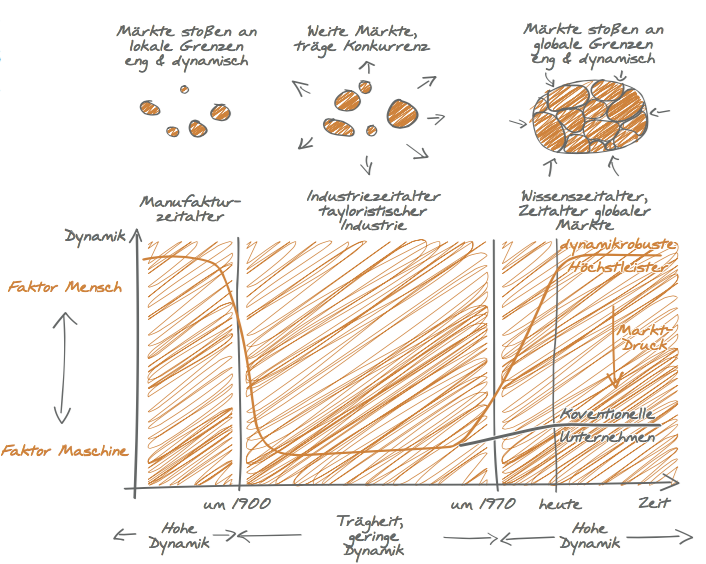In our rapidly developing economy, the digitalization of work and communication processes is playing a more important role than ever before. Whether in the automotive industry (e.g. car sharing), machine manufacturing (e.g. M2M communication) or in everyday private life (e.g. Paypal, MyTaxi and many more) - digitalization has become an integral part of our lives.
But what challenges does the change brought about by digitalization pose for our everyday working lives? What do companies need to adapt to today in order to remain competitive tomorrow? What skills do generations Y and Z bring with them and what does this mean for today's companies?
For many entrepreneurs, the importance of the above questions may be secondary, as the actual topic - digitalization itself - is already a major challenge. Time to market, return on investment and market share are the hard facts that need to be managed - why should you also devote yourself to topics such as soft skills, team empowerment and performance?
... because we live in the age of knowledge!

Digitization is not just a new technology that can simply be implemented or rolled out - digitization represents an economic evolutionary development of work and is thus catapulting the global economy into a completely new age - the age of knowledge / age of global markets - in which people and their knowledge are the most important "capital" of a company. Comparable to the manufacturing age, the economy today is dependent on people producing and implementing things. The only difference is that people today are needed with their intellectual capital instead of their physical effort. The age of industrialization ensured that physically strenuous work was no longer performed by humans but by machines. The consequence of this was an economic dependence away from humans and towards industrially more productive machines.
In addition to conventional companies that continue to focus on the machine factor when it comes to digitalization, other companies are developing further. Key figures such as time to market, return on investment and market share are not being neglected (as is often assumed), they are simply being optimized through a more appropriate approach, such as promoting high-performance teams and a management style that empowers employees rather than monitoring them.
The "dormant capital"
Collective knowledge is today's capital of the new Generation Y (born 1981-1994). Companies that want to make the most of their employees should first understand what it takes to awaken this "dormant capital".
The needs of Generation Y are completely different from those of the previous generations "baby boomers" (1946-1964) and Generation X (1965-1980).
Needs such as dominant management styles or lifelong job security are now being overtaken by Generation Y with the following demands:
- lifelong learning
- Clear requirements and objectives
- Flat hierarchies/short decision-making paths
- Focus on work tasks not Working time
- Appropriate work-life balance
- Recognition of own performance and appropriate remuneration
- Responsibility, creative freedom and independent work
- Modern technology and open networks
However, there are minimum requirements for organizations that want to address these needs. In addition to a tolerant error culture and the strong involvement and encouragement of employees, the courage to try things out is required above all.
Only on this basis can collective knowledge "dormant capital" be identified in the company and consequently used effectively for the economic benefit of the company.

Write a comment